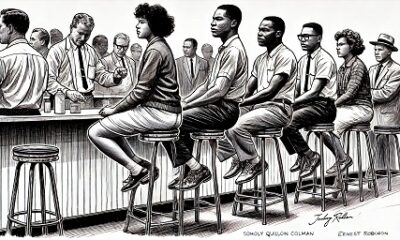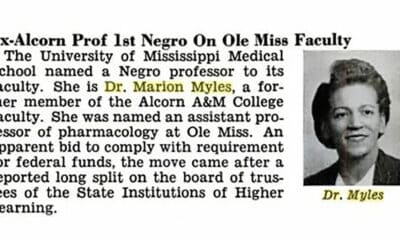Mississippi Today
Kellen Moore, now the NFL’s youngest head coach, inherits an aging Saints roster

Archie Manning remembers Kellen Moore coming to the Manning Passing Academy at Thibodaux, Louisiana, as a counselor during the summer of 2010, just before Moore’s junior season at Boise State.
Moore had just turned 22. But, said Manning, “He looked like he was 12.”

“I remember him as a really nice, polite kid, a left-hander” Manning said. “He was a coach’s son. His daddy was a legendary high school coach in Washington (state). I remember that he didn’t have the arm strength that a lot of the quarterbacks we bring in have. He wasn’t a big guy, but he was really accurate and he knew where to go with the ball. He impressed me as being really, really smart, ahead of the game. As so many coaches’ sons do, he really understood the game.
“I don’t know how much he got from us, but he must have enjoyed the camp and gotten something out of it because he came back the next year.”
Yes, and Moore has enjoyed south Louisiana a lot lately. Sunday, in the Superdome, he called the plays for the Philadelphia Eagles in their Super Bowl trouncing of the two-time defending NFL champion Kansas City Chiefs. He was back in the Crescent City Wednesday to start his new job as head coach of the New Orleans Saints.
Fixing the Saints will be much more difficult than torching the Chiefs, and we will get to that shortly. But first some more background on Moore, who will not turn 37 until July. Most college football fans will remember Moore for his remarkable four-year run as the starting quarterback at Boise. After redshirting as a freshman, he led the Broncos to a ridiculous 50-3 record over the next four seasons 2008-11. Southern Miss fans should recall that in 2008, Moore’s freshman season, Boise State came to Hattiesburg and trounced a good Jeff Bower-coached Southern Miss team 24-7. For his Boise career, he completed 70% of his passes for nearly 15,000 yards. He threw for 142 touchdowns, compared to just 28 interceptions. Clearly, he was really accurate and did know where to go with the football, which was quite often into the end zone.
Despite all those gaudy statistics, Moore was not drafted. He wasn’t quite six feet tall and, again, he lacked elite arm strength. He signed as a free agent with the Detroit Lions and played sparingly over six NFL seasons with the Lions and the Cowboys, retiring in 2017.
The Cowboys, who saw firsthand Moore’s football knowledge, hired him in 2018 as their quarterbacks coach. In 2019, at age 32 he was promoted to offensive coordinator. He has also served, successfully, as offensive coordinator of the San Diego Chargers (2023) and, of course, the Eagles last season. Perhaps the best way to put into perspective his contributions to the Eagles’ championship run is this: In 2023, Eagles quarterback Jalen Hurts threw 15 interceptions and had a passer rating of 89.1. Under Moore, Hurts threw just five interceptions and had a passer rating of 103.7. That’s a huge, huge jump.
No doubt, naysayers will point out that calling successful plays with Hurts throwing and running, A.J. Brown and DeVonta Smith catching, and Saquon Barkley running should not be confused with inventing the wheel. And those same critics will correctly say Moore won’t have that many highly skilled weapons to work with in New Orleans. (He also will not have the same quality offensive line wearing black and gold as he had wearing green and silver.)
Other critics will question whether a guy who will have just turned 37 when the 2025 Saints begin training camp will have the experience (both football- and management-wise) to command an NFL coaching staff and football team. And, frankly, given the choice I probably would have at least gauged the interest of highly successful Baltimore Ravens’ offensive coordinator Todd Monken before hiring a guy 23 years younger and with far less experience, none as a head coach.
But we all know Sean McVay coached the Los Angeles Rams to the Super Bowl at age 32 and won it all at age 36. You don’t have to have a gray beard to coach football. That said, Moore is only a year older than Saints defensive stars Demario Davis and Cam Jordan. A bigger problem for Moore is that the league’s youngest head coach will inherit one of the league’s oldest rosters. At the risk of mixing cliches, the Saints are as long in the tooth as their new coach is wet behind the ears.
Manning, who still closely watches his hometown team, put it this way: “Kellen’s got his hands full. The Saints have some issues.”
The biggest of those: The Saints are a league-worst $54 million over the NFL salary cap. Some of those salaries must be slashed or eliminated. The league’s youngest head coach faces huge decisions, beginning with what to do about quarterback. Go with Derek Carr? Or start over and go younger? The Saints do have the ninth pick of the upcoming draft. That’s just for starters. As Manning put it, the Saints have issues, as in plural. It’s hard to get a whole lot better while chopping the payroll so drastically.
This all will be interesting to watch. And we should all remember what happened the last time the Saints hired a young, former Dallas Cowboys offensive coordinator as their young head coach. Sean Payton, like Moore, had never been a head coach before he took the Saints job. That worked out pretty well, did it not?
This article first appeared on Mississippi Today and is republished here under a Creative Commons license.![]()
Mississippi Today
On this day in 1960
On this day in 1960
March 16, 1960

Inspired by the Greensboro sit-in a month earlier, Black students staged sit-ins at whites-only lunch counters in eight downtown stores in Savannah, Georgia.
Students Carolyn Quilloin Coleman, Joan Tyson Hall and Ernest Robinson stepped into Levy’s Department Store, shopping before entering the segregated Azalea Room. The server ordered them to leave, but they attempted to order anyway. Police hauled them to jail, where they sang, “We Shall Overcome.”
Robinson recalled looking at his hand where he scrawled the words of a Psalm: “Yea, though I walk through the valley of the shadow of death, I will fear no evil: for thou art with me; thy rod and thy staff they comfort me.”
“That verse uplifted us,” Coleman told the Savannah Morning News. “We were very familiar with what had happened to Emmett Till, a 14-year-old student who was killed in Mississippi for allegedly whistling at a White girl across the street. While we thought that we were safe in Savannah, we knew that anything could happen.”
In response, Black leaders W.W. Law, Hosea Williams and Eugene Gadsden organized a boycott of city businesses and led voter registration drives that brought changes to city government. Seven months later, Savannah repealed its ordinance requiring segregated lunch counters. The boycott continued until all facilities were desegregated in October 1963.
Months later, Martin Luther King Jr. arrived to hail the passing of Jim Crow ways. The Levy’s Department Store building now houses the Savannah College of Art and Design’s Jen Library, and a historic marker now honors the students’ fight for freedom.
This article first appeared on Mississippi Today and is republished here under a Creative Commons license.![]()
Mississippi Today
The quiet part out loud: Mississippi political leaders tolerate tax burden on poor
The quiet part out loud: Mississippi political leaders tolerate tax burden on poor
Former Gov. Haley Barbour finally said the quiet part out loud.
During a recent speech to the Mississippi State University Stennis Institute of Government and Capitol Press Corps, the former two-term governor and master communicator said taxing groceries was a good thing because everybody has to eat.
Barbour reasoned that it is important for all people to have skin in the game — to pay taxes — because “otherwise, they will vote to pave the streets with gold if they don’t have to pay anything.”
Various conservative politicians and other policymakers espouse the Barbour philosophy that a tax on food is fair and necessary. To ensure that poor people pay taxes, too, they advocate for a grocery tax that absorbs a much greater percentage of the income of low income families.
The quiet part out loud is a reference to the fact that as governor from 2004 until 2012, Barbour blocked legislative efforts to eliminate the grocery tax and offset that lost revenue, at least in part by increasing the tax on cigarettes. Barbour vetoed two bills in 2006: one to eliminate the highest in the nation 7% tax on food and the other to cut in half the levy on groceries.
Veto messages are where governors articulate their reasoning for opposing legislation. In neither veto of the grocery tax cut bills did the governor talk about “fairness.”
Instead, he talked about the fact that the combination of cutting or eliminating the grocery tax and increasing the cigarette tax was not revenue neutral. The legislation, Barbour argued at the time, would produce less revenue for the state.
He maintained that it sent the wrong message to cut taxes at a time when he was going to Congress to try to secure federal funds to help with the recovery from the devastation caused by Hurricane Katrina. And in fairness to the governor, Hurricane Katrina was the seminal event of Barbour’s tenure as governor and one of the seminal events in the state’s history, and his ability to obtain those funds was paramount for the success of the Gulf Coast and south Mississippi.
So it is fair to say Katrina was heavy on Barbour’s mind in 2006 when the Legislature sent him the bills to cut the grocery tax.
It is clear, though, that Mississippi’s political leadership still has similar views as Barbour on the grocery tax. Since Barbour has left office, there have been two major reductions in the income tax: one in 2016 when Phil Bryant was governor and another in 2022 when Tate Reeves was governor.
There has been no cut in the grocery tax during that time.
This year the Senate proposes another major cut in the income tax and a reduction in the grocery tax from 7 cents to 5 cents on every dollar purchase of groceries.
There are efforts by the House leadership and Reeves to completely eliminate the income tax. In addition, the House tax cut plan essentially would trim the grocery tax to 5.5%. The House plan in most instances also would raise the sales tax on most other retail items from 7% to 8.5%.
And there are retail items other than groceries that most all people need. After all, most everyone, including poor people who might not pay an income tax, must buy clothes, household utensils and numerous other retail items that under the House plan would cost more because of the increase in the sales tax.
In short, there are many opportunities other than the grocery tax to collect taxes from poor people.
But just to recap:
• Only 12 states tax food like Mississippi does.
• Mississippi not only has the highest state-imposed tax on food, but also has one of the country’s highest sales taxes on other retail items.
• Mississippi has one of the lowest income taxes in the country and it is getting even lower thanks to the 2022 tax cut that is still being phased in.
The aforementioned tax structure results in Mississippi’s low-wage earners paying a greater percentage of their income in state and local taxes than do the state’s more affluent residents, a 2024 study found.
The report by the Institute of Taxation and Economic Policy found that Mississippi has the nation’s 19th-most regressive tax system where low-income residents are forced to pay a larger percentage of their income in taxes than the state’s wealthier citizens.
The study shows the income tax is the only component of the Mississippi tax system that requires the wealthy to pay more than the poor.
And even though Mississippi has the nation’s highest percentage of poor people, the quiet part that needs to be told louder is that our leaders are working to make the tax structure even more regressive.
This article first appeared on Mississippi Today and is republished here under a Creative Commons license.![]()
Mississippi Today
At least 3 dead in Mississippi after likely tornadoes sweep through the state
At least 3 dead in Mississippi after likely tornadoes sweep through the state
Violent tornadoes ripped through parts of the U.S. this weekend, killing at least three people in Mississippi and damaging several communities across the Magnolia State.
Two separate likely tornadoes hit Walthall County on Saturday afternoon, killing three people near Darbun along Bethlehem Loop Road, according to the county’s Emergency Management Director Royce McKee.
Walthall County Sheriff Kyle Breland told WLBT there are also injuries, collapsed homes, and trees blocking roadways in the county.
The National Weather Service in Jackson on Saturday afternoon had issued a tornado emergency for two separate tornadoes that moved through Walthall County. That rare official designation of a “large and dangerous tornado” continued into Marion, Lawrence and Jefferson Davis counties. Numerous other tornado warnings were issued before storms cleared out of the state by Saturday late afternoon.
Before sunrise early Saturday morning, a likely tornado ripped through the Elliott community in Grenada County, destroying several homes and damaging other buildings. No fatalities were reported in that storm.
“All of a sudden, it got like a freight train,” Robert Holman told FOX Weather of the Elliott storm. “Then all of a sudden, we just heard stuff just falling all on the house.”
The storms knocked out power to about 25,000 people across the state.
Though Mississippi was in the Saturday bullseye for the tornado outbreak, the same storm system affected much of the U.S. over the weekend.
The number of fatalities increased after the Kansas Highway Patrol reported eight people died in a highway pileup caused by a dust storm in Sherman County Friday. At least 50 vehicles were involved.
Missouri recorded more fatalities than any other state as it withstood scattered twisters overnight that killed at least 12 people, authorities said. The deaths included a man who was killed after a tornado ripped apart his home.
“It was unrecognizable as a home. Just a debris field,” said Coroner Jim Akers of Butler County, describing the scene that confronted rescuers. “The floor was upside down. We were walking on walls.”
Dakota Henderson said he and others rescuing people trapped in their homes Friday night found five dead bodies scattered in the debris outside what remained of his aunt’s house in hard-hit Wayne County, Missouri.
“It was a very rough deal last night,” he said Saturday, surrounded by uprooted trees and splintered homes. “It’s really disturbing for what happened to the people, the casualties last night.”
Henderson said they rescued his aunt from a bedroom that was the only room left standing in her house, taking her out through a window. They also carried out a man who had a broken arm and leg.
Officials in Arkansas said three people died in Independence County and 29 others were injured across eight counties as storms passed through the state.
“We have teams out surveying the damage from last night’s tornadoes and have first responders on the ground to assist,” Arkansas Gov. Sarah Huckabee Sanders said on X.
She and Georgia Gov. Brian Kemp declared states of emergency. Kemp said he was making the declaration in anticipation of severe weather moving in later Saturday.
On Friday, meanwhile, authorities said three people were killed in car crashes during a dust storm in Amarillo in the Texas Panhandle.
Tornadoes hit amid storm outbreak
The Storm Prediction Center said fast-moving storms could spawn twisters and hail as large as baseballs on Saturday, but the greatest threat would come from winds near or exceeding hurricane force, with gusts of 100 miles per hour possible.
Significant tornadoes continued to hit Saturday. The regions at highest risk stretch from eastern Louisiana and Mississippi through Alabama, western Georgia and the Florida panhandle, the center said.
Bailey Dillon, 24, and her fiance, Caleb Barnes, watched a massive tornado from their front porch in Tylertown, Mississippi, about half a mile (0.8 km) away as it struck an area near Paradise Ranch RV Park.
They drove over afterward to see if anyone needed help and recorded a video depicting snapped trees, leveled buildings and overturned vehicles.
“The amount of damage was catastrophic,” Dillon said. “It was a large amount of cabins, RVs, campers that were just flipped over — everything was destroyed.”
Paradise Ranch reported on Facebook that all its staff and guests were safe and accounted for, but Dillon said the damage extended beyond the ranch itself.
“Homes and everything were destroyed all around it,” she said. “Schools and buildings are just completely gone.”
Some of the imagery from the extreme weather has gone viral.
Tad Peters and his dad, Richard Peters, had pulled over to fuel up their pickup truck in Rolla, Missouri, Friday night when they heard tornado sirens and saw other motorists flee the interstate to park.
“Whoa, is this coming? Oh, it’s here. It’s here,” Tad Peters can be heard saying on a video. “Look at all that debris. Ohhh. My God, we are in a torn …”
His father then rolled up the truck window. The two were headed to Indiana for a weightlifting competition but decided to turn around and head back home to Norman, Oklahoma, about six hours away, where they encountered wildfires.
Wildfires elsewhere in the Southern Plains threatened to spread rapidly amid warm, dry weather and strong winds in Texas, Kansas, Missouri and New Mexico.
A blaze in Roberts County, Texas, northeast of Amarillo, quickly blew up from less than a square mile (about 2 square kilometers) to an estimated 32.8 square miles (85 square kilometers), the Texas A&M University Forest Service said on X. Crews stopped its advance by Friday evening.
About 60 miles (90 kilometers) to the south, another fire grew to about 3.9 square miles (10 square kilometers) before its advance was halted in the afternoon.
High winds also knocked out power to more than 200,000 homes and businesses in Texas, Oklahoma, Arkansas, Missouri, Illinois, Indiana and Michigan, according the website poweroutage.us.
Extreme weather encompasses a zone of 100 million people
The deaths came as a massive storm system moving across the country unleashed winds that triggered deadly dust storms and fanned more than 100 wildfires.
Extreme weather conditions were forecast to affect an area home to more than 100 million people. Winds gusting up to 80 mph (130 kph) were predicted from the Canadian border to Texas, threatening blizzard conditions in colder northern areas and wildfire risk in warmer, drier places to the south.
The National Weather Service issued blizzard warnings for parts of far western Minnesota and far eastern South Dakota starting early Saturday. Snow accumulations of 3 to 6 inches (7.6 to 15.2 centimeters) were expected, with up to a foot (30 centimeters) possible.
Winds gusting to 60 mph (97 kph) were expected to cause whiteout conditions.
Evacuations were ordered in some Oklahoma communities as more than 130 fires were reported across the state. Nearly 300 homes were damaged or destroyed. Gov. Kevin Stitt said at a Saturday news conference that some 266 square miles (689 square kilometers) had burned in his state.
The State Patrol said winds were so strong that they toppled several tractor-trailers.
Experts said it’s not unusual to see such weather extremes in March.
Mississippi Today editors contributed to this Associated Press report. Bruce Shipkowski reported from Toms River, New Jersey. Julie Walker reported from New York. Rebecca Reynolds contributed from Louisville, Kentucky. Jeff Roberson in Wayne County, Missouri, Eugene Johnson in Seattle and Janie Har in San Francisco contributed.
This article first appeared on Mississippi Today and is republished here under a Creative Commons license.![]()
-

 News from the South - Oklahoma News Feed5 days ago
News from the South - Oklahoma News Feed5 days agoLong Story Short: Bill to Boost Rural Mental Health and Diversion Programs Advances
-

 News from the South - North Carolina News Feed7 days ago
News from the South - North Carolina News Feed7 days agoLumbee tribe may finally receive long-sought federal recognition
-

 News from the South - Florida News Feed7 days ago
News from the South - Florida News Feed7 days agoHeavy rain, gusty winds expected in Central Florida
-

 News from the South - Oklahoma News Feed5 days ago
News from the South - Oklahoma News Feed5 days agoBlood stain leads to 2 arrests in 1997 Oklahoma cold case
-

 Mississippi Today4 days ago
Mississippi Today4 days agoOn this day in 1965
-

 News from the South - Missouri News Feed7 days ago
News from the South - Missouri News Feed7 days agoSt. Louis forecast: Temperatures warm up this week
-

 News from the South - Alabama News Feed5 days ago
News from the South - Alabama News Feed5 days agoCannabis cultivator celebrates Alabama licensing ruling
-

 News from the South - Oklahoma News Feed6 days ago
News from the South - Oklahoma News Feed6 days agoFormer DHS worker charged with kidnapping says ‘another personality’ caused her to take the child












































